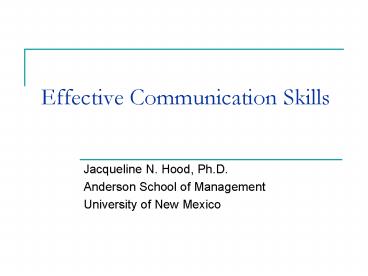Effective Communication Skills - PowerPoint PPT Presentation
1 / 18
Title:
Effective Communication Skills
Description:
Understand your preferred communication style. Discuss the importance of nonverbal communication ... of strength; flippant, sarcastic style; air of superiority. ... – PowerPoint PPT presentation
Number of Views:206
Avg rating:3.0/5.0
Title: Effective Communication Skills
1
Effective Communication Skills
- Jacqueline N. Hood, Ph.D.
- Anderson School of Management
- University of New Mexico
2
Objectives
- Understand the importance of effective
communication skills - Discuss appropriate channels of communication
- Learn about the formal and informal channels
- Understand your preferred communication style
- Discuss the importance of nonverbal communication
- Develop effective listening skills
3
All people have at least two kinds of needs
- Practical need to reach a goal
- Personal need to feel understood and involved
- Addressing BOTH needs helps ensure a successful
interaction takes place
4
Keeping a Winning Team on Track
- The team is focused on the big picture
- Does each person clearly know how his/her
particular input is valuable to the organization? - Stay connected to your teammates
- Is everyone on the same page, while still pulling
in their own unique way? - Communicate and involvement of all team members
- People cannot support what they do not understand.
5
Information Channels
- Using examples from your current workload, list
an appropriate topic for each channel. - Type of message Information channel Appropriate
topic - Nonroutine/
- Ambiguous Face-to-face conversation ______________
__ - Telephone conversation ________________
- Electronic mail ________________
- Memo, letter ________________
- Flier, bulletin, report ________________
- Routine/Clear
6
Three Basic Communication Styles
7
Effectiveness of Communication
- 55 of Impact Facial expression
- 35 of Impact Tone of voice and inflection
- 10 of Impact Message itself
8
Nonverbal Communication
- Gestures
- Paralanguage
- Idiosyncratic acts
- Postures
- Spatial behavior
- Clothing
- Physical signs
9
Three Emotional Sets or Attitudes Conveyed
Nonverbally
- Extent of Liking or Disliking
- Extent of Submissiveness or Dominance
- Responsiveness
10
Status and Power Cues
- Personal Space
- Body Size
- Backing Off
- Touching
- Smiling
- Eye Contact
11
Types of Listening
- Hearing
- Analyzing
- Empathizing
12
Barriers to Effective Listening
- Prejudging the communicator or the communication
- Rehearsing a response
13
Guide to Active Listening
- Stop
- Look
- Listen
- Ask questions
- Paraphrase the content
- Paraphrase the feelings
14
What did I say?
- Judgmental words
- How could you do such a dumb thing?
- Authoritarian words
- Here is what you are going to do to get this
done right.
- Descriptive words
- Can you explain what caused the incident?
- Supportive words
- What suggestions do you have to get this done on
time in the future?
15
More ways to say the same thing
- Superiority
- I was doing it this way before you were born.
- Dogmatic
- This is the best solution, period.
- Equality
- We have done it this way for years, but I would
like to hear your ideas on how we can do it
better. - Accepting
- This is the best solution I could come up with.
What other possibilities do you see?
16
Exercise Listen Without an Agenda
- With a partner, practice listening without your
own agenda. Notice when your agenda comes up
through - 1. Associating That happened to me.When you
hear a story, you automatically start thinking
about a similar person, place or event. Example
The speaker is describing her micromanaging boss,
and you begin to think about your own boss, or a
friend who is in a similar situation. - 2. Comparing Im not as good as you, Im
better than you, or Im equal to you.When you
compare an aspect of your own life to what the
speaker is talking about. Example Hearing about
the speakers new promotion triggers you to judge
your own career accomplishments. - 3. Projecting Heres whats really going on
for you - When you place your own interpretation on the
speakers situation. Example An employee
complains about not getting as much work done as
he used to, and you interpret that hes lazyor
that hes overworkedor that hes inefficientor
that hes aging - As human beings, we tend to think its always
about US. - But, its never about US. Its about the
speaker.
17
Ask Exploratory Questions
- Ask open ended questions
- Ask WWWWH questions
- Ask questions that expand possibilities for
extraordinary results - Pause and listen after a question
18
Interactive Leadership
- Encourage participation
- Share power and information
- Enhance other peoples self-worth
- Get others excited about their work































